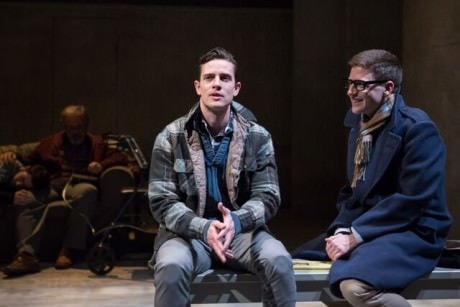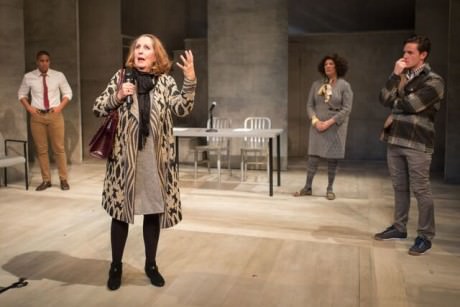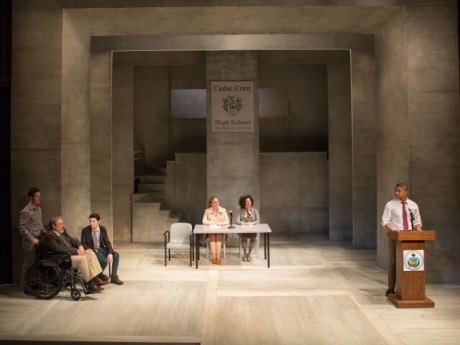At the heart of Stephen Karam’s Sons of the Prophet are his Old-Testament Job-like questioning of an unseen, unknown higher presence. Questions abound around the matter of why do we (and, of course, the on-stage characters) suffer? Are they and we being somehow punished for some unremembered wrong-doing? Or are the calamities that we face in life just random, arbitrary and unselective with no higher-power hand in any of it?

Is the answer that suffering can be softened by faith and spirituality and human resilience? Or are the calamities that face just random, arbitrary and unselective with no higher-power hand in any of it? At times, Karam gives the audience absurd comedy at times so that the audience does not become overwhelmed with the play’s quite rueful pain, and therefore missing the finer points and deeper thinking he has laid out right before our eyes and ears.
Now that is quite a bit of heavy lifting for the intermission-free generally successful, engaging 105 minutes of Sons of the Prophet the current offering at DC’s Theater J. The production is masterfully directed by Gregg Henry.
The dark-comedy Sons of the Prophet arrives in the DC area with plenty of gravitas. It’s previous recognition includes being a finalist for the 2012 Pulitzer Prize. It received a number of NYC theater awards including the Lucille Lortel Award for Outstanding Play, the New York Drama Critics’ Circle Award and the Outer Critics Circle Award for Best Play for 2011-12. My DCMetroTheaterArts colleague John Stoltenberg has given Sons of the Prophet his highest praise.
Sons of the Prophet begins with the sounds of a chance accident that we later learn involves a plastic deer decoy in the middle of a northeast Pennsylvania road on a fall night. From there we are off to many mysterious calamities of Biblical proportions involving health, death, personal privacy, and other afflictions. The misfortunes bring a family that has emigrated from Lebanon a plentitude of anguish, travail, and sorrow.
Each of the characters in Sons of the Prophet ache for understanding of what is happening to them. They often react with comic wit to the dark clouds that surrounds them. (An aside, will digital generations now always see the word “cloud” and think only good things). As written by Karam, many of the characters reach back to their Lebanese roots for understanding of their on-going travails.

And from those roots come two very key beings with some answers or perhaps more questions. Neither of who have a speaking role. The two are Lebanon-born Kahlil Gibran who wrote the prose-poem, The Prophet with its phrase All is Well that many a Baby Boomer read and ascribed to in their youth. Gibran also wrote, “Out of suffering have emerged the strongest souls; the most massive characters are seared with scars.”
DC area residents might readily recall that Gibran has strong connections to this area. There is a small memorial garden dedicated to him located in Normanstone Park off Massachusetts Ave. The memorial garden is now about 30 years old.
The second person is a strong presence in Sons of the Prophet is the Lebanon-born Saint Rafka. She is not only mentioned numerous times in the production, but her image appears projected for the audience’s viewing for long stretches of time. In an on-line search I found how closely Saint Rafka wanted to connect with God: “Why, O my God, have you distance yourself from me and have abandoned me. You have never visited me with sickness!”
Sons of the Prophet crosses generational boundaries especially in its comic jab at pain and suffering. For some it may not be unlike Borscht Belt comedians that many in the Theater J audience on the night I saw the show could identify with, and recall from their youth. And certainly the Millennials in the audience roared with laughter when the word “pank” was used with its double-meaning, or with the long-running, iconic TV show Little House on the Prairie.
So, be ready for to not only laugh but be prepared for a journey into some discomfort if you are truly open to Sons of the Prophet. You will be rewarded. I praise Theater J for bringing Sons of the Prophet to us.

This was the final production under the leadership of Shirley Serotsky, as the Acting Artistic Director of Theater J. A big loud round of applause to Shirley for her work over these many months.
And, welcome to Adam Immerwahr who has been selected as Theater J’s new Artistic Director. He was the former associate A.D. from New Jersey’s McCarter Theatre.
Running Time: One hour and 45 minutes, with no intermission.
Sons of the Prophet plays through December 20, 2015 at Theater J at The Washington DCJCC’s Aaron & Cecile Goldman Theater – 1529 16th Street, NW, (16th and Q Streets), in Washington, DC. For tickets, call the box office at (800) 494-8497, or purchase them online.





